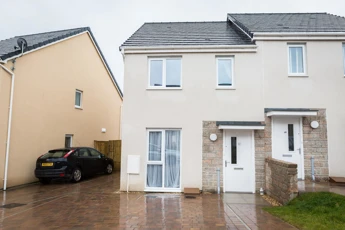
There are plenty of mortgage deals on the market and choosing one that's going to suit you is an important part of the homebuying journey.
Even if you're not clued up on the different types of mortgage deals and rates available, our handy guide is here to help.
When shopping for mortgage deals, the term ‘fixed rate’ comes up a lot. So what exactly is a fixed rate mortgage and how do they differ from other mortgage deals?
What is the meaning of a fixed rate mortgage deal?
A fixed rate mortgage is a deal in which the interest on your monthly mortgage repayments remains at the same rate for a time period that you prearrange with your lender.
What happens when the fixed term ends?
After the fixed rate period ends, you will usually fall onto the lender's standard mortgage rate, also known as the standard variable rate (SVR).
This can be higher than the fixed rate you were paying, so you may want to lock in another fixed rate agreement when your current one expires. We recommend starting to look at this around 6 months before your deal is set to expire.

How long should you fix your mortgage interest rates for?
Currently your mortgage can be fixed for up to ten years. While there may be longer deals out there, they’re not common.
If you choose to remortgage or move house before the discounted period ends, you may have to pay an early repayment charge, which is typically based on how far you are into your deal and how much you borrowed.
Another disadvantage of a longer fixed rate is that mortgage lenders tend to offer a higher interest rate as they don't know what the market will look like in ten years.
To find out what’s going to suit your circumstances, speak to a mortgage adviser about your property plans. They can offer unbiased advice about the most appropriate fixed term deal for your current and future situation.
Should you remortgage before the end of your fixed term?
Keeping a close eye on your mortgage deal before the end of your fixed term ensures that you don’t fall into the lender’s SVR without getting another discounted fixed term deal.
If you let the fixed term end without remortgaging, you will be placed on an SVR, which could increase your monthly mortgage repayments.
What are the alternatives?
If you're concerned about paying early repayment penalties or you are expecting to relocate within the next year or two, you still have options.
For instance, you could start your mortgage off at a variable rate. This means that you could pay a different sum each month. It offers you more flexibility in terms of timings, and if the variable rate happens to drop, you could end up saving some money.
Should you get a mortgage with a fixed or variable rate?
Locking in a fixed rate arrangement might help you stop the possible increase in monthly repayments should your variable rate increase, given the market's unpredictable nature. That being said, if your short or long-term goals don’t align with being locked into something then a fixed rate mortgage may not suit you.
If you’re thinking of getting a mortgage or are looking at remortgaging, get in touch with one of our friendly expert advisers. We’re perfectly positioned to help you make an informed decision that is going to suit your individual needs and circumstances.

Important information
Your home may be repossessed if you do not keep up repayments on your mortgage.
There may be a fee for mortgage advice. The actual amount you pay will depend on your circumstances. The fee is up to 1% but a typical fee is 0.3% of the amount borrowed.




